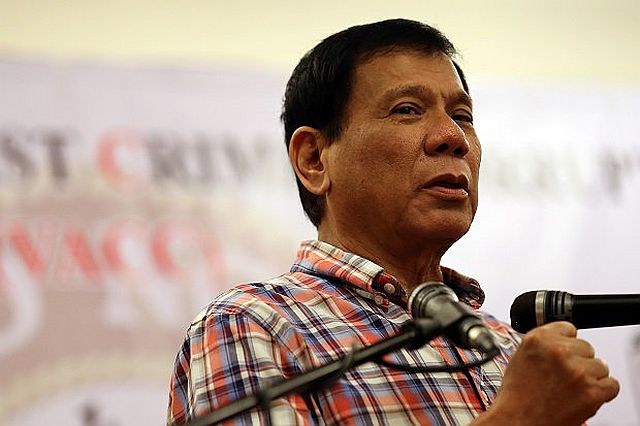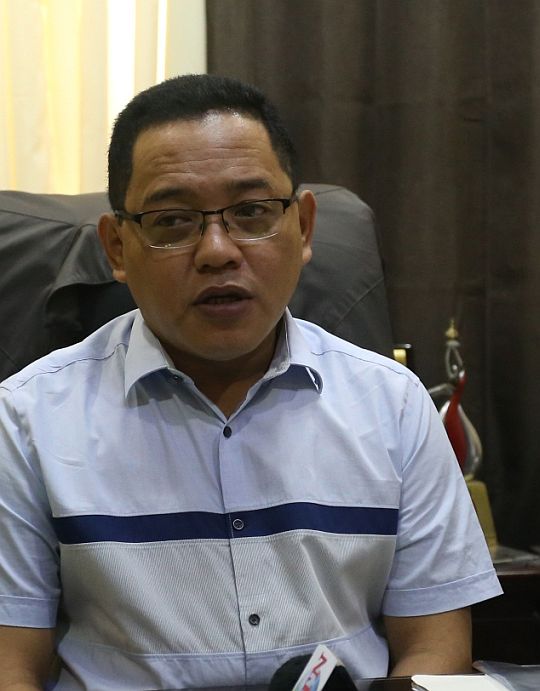DUTERTE’S REVELATION: KOREAN MAFIA ‘STRONGEST’ IN CEBU

Duterte
Members of a supposed “Korean mafia” have the “strongest” presence in Cebu province, selling illegal drugs and running a prostitution ring in the economic powerhouse of the Central Visayas region.
The revelation came from President Rodrigo Duterte himself who, while speaking with reporters in Davao City on Saturday night, warned the unscrupulous South Korean tourists involved in unlawful activities that they would be treated just like any other criminal.
A police officer, who belonged to the now-disbanded Anti-Illegal Drugs Group (AIDG) of the Philippine National Police, had told the INQUIRER that a group of South Korean criminals masterminded the abduction and killing of their compatriot, Jee Ick-joo, which was now blamed on scalawags in the PNP.
The President acknowledged the information provided by the unidentified police officer, whose claim was also supported by PNP chief Director General Ronald dela Rosa.
“It’s (Korean mafia) strongest in Cebu,” said the Chief Executive. “If you ask anyone in Cebu or you go to Cebu for an investigative journalism, you will find out. Cebu is the hardest hit (of their criminal activities).”
“I’ve always heard from all intelligence sources that in Cebu, with due respect to the South Korean government, they were behind the illegal drug trade and prostitution there,” he added.
They are here
While others expressed surprise over this revelation, Philippine Drug Enforcement Agency in Central Visayas PDEA 7) director Yogi Filemon Ruiz was not among them.

BATO
Ruiz revealed that the Korean mafia has been existing in Cebu long before Mr. Duterte revealed their presence here.
Ruiz, in an interview with Cebu Daily News, said it was in 2009 when he was still a deputy regional director of PDEA 7, when they learned about the Korean mafia running a drug trade in Cebu.
He said their investigation in the death of a Korean family massacred on Mactan Island in 2009 led them to discover that it was the handiwork of a Korean mafia over a soured deal with the family’s patriarch, who operated a restaurant.
Ruiz said they have no information linking a Korean gang to prostitution, but he said this is likely true since the President has access to information that the PDEA does not know anything about.
He said they have confirmed that some Koreans have been engaged in the drug trade as evidenced by the arrest in September last year of Kim See Woong, 47, also known as alias Kuma, a Korean tourist guide in Lapu-Lapu City who was just one of undetermined number of Koreans who imported and pushed illegal drugs on the island.
Ruiz said their monitoring indicated that this group of Korean drug pushers mostly smuggled in drugs from Thailand. Another group smuggled drugs from the Philippines to South Korea, since drug is cheaper in the Philippines than in their own country.
Ruiz, however, said it has been hard for anti-drug agents to penetrate the Korean mafia since they hardly transact with Filipinos and they only deal with fellow Koreans.
Big Korean community
Cebu has an estimated 25,000-strong South Korean community as of 2015, who mostly live in condominium-styled enclaves centered around a school teaching Koreans to speak and write in English.
The Korean Consulate in Cebu, sought for comment, vowed to help authorities in investigating the allegation of President Rodrigo Duterte that a Korean mafia is involved in the illegal drug trade and prostitution in Cebu.
But Consul General Oh Sung Yong of the Consulate of the Republic of Korea in Cebu said they have no idea about the President’s allegations.
“I did not hear it before. (But) we will (do what we can to extend) help for Philippine police to wipe out the mafia in Cebu,” he told Cebu Daily News in a text message.
“I don’t have a problem with law-abiding Koreans. You will be protected, you will be treated equally as a Filipino,” Mr. Duterte said in an interview on Saturday night.
“But for those who are into the racket of prostitution, (illegal) drugs and kidnapping, well, you will be treated just (like) an ordinary criminal. You do not enjoy special privileges just because you’re a foreigner,” he said.
The President has apologized to Seoul for Jee’s kidnap-slaying, which was blamed on a group of rogue policemen who allegedly used Mr. Duterte’s bloody anti-drug campaign to commit the crime.
Jee’s killing, which showed that the government’s crackdown was prone to abuses, also prompted Mr. Duterte to temporarily bar the PNP and the National Bureau of Investigation from conducting drug raids.
Short-term effect
Meanwhile, Cebu City Councilor Dave Tumulak, the city’s deputy mayor on police matters, said he has not also heard about a Korean mafia in Cebu.
“I haven’t heard about anything like that so far. But I will entrust that matter to CCPO (Cebu City Police Office) director Senior Supt. Joel Doria to investigate and gather information to attest the allegation of the President,” Tumulak told CDN.

TUMULAK
Edilberto Mendoza, president of the Cebu Association of Tour Operators (Cato), said the President’s revelation might affect investments and business partnerships involving South Korean entities but not in the long-term.
“I don’t think it will (have that much of an effect), only probably for a while,” he said in a text message on Sunday.
He said local traders might become more cautious in their dealings with South Koreans while the latter may also feel offended by the President’s remarks.
Mendoza, however, said that since the revelation came from the President, this was a serious matter that needs to be investigated, and if proven true, Cebuanos should be vigilant especially with so many South Korean visitors here.
Tourism data
Data from the Department of Tourism in Central Visayas (DOT-7) showed that 626,364 South Koreans visited the region from January to September 2016, most of whom, or 593,946 came to Cebu, making the island-province the top tourism destination for South Koreans.
About one million South Korean tourists visit the country each year, according to DOT data gathered from international airports all over the country.
According to South Korea’s Ministry of Foreign Affairs (MOFA), there are over 89,000 Korean expatriates living in the Philippines as of 2015. Of this number, 25,000 are living in Cebu.
As of 2007, there have been 200 recorded Korean businesses in various cities in the province.
The Korea Times reported that many South Koreans are drawn to the Philippines due to the low-cost of English-language education and housing, both significantly cheaper than those offered in their native country.
The warmer climate is yet another motivating factor for the recent surge in migration, the publication added.
Furthermore, the Philippines is also a popular destination for retired South Koreans on fixed pensions since the Philippine government actively promotes the settlement of retirees here because of the potential lucrative opportunities for the local economy.
Mendoza said the government as well as the private sector should be extra careful when dealing with these visitors.
“(We should) report right away any malicious actuations by this group of people,” he said./with reports from Jose Santino Bunachita and Victor Anthony V. Silva
Disclaimer: The comments uploaded on this site do not necessarily represent or reflect the views of management and owner of Cebudailynews. We reserve the right to exclude comments that we deem to be inconsistent with our editorial standards.
